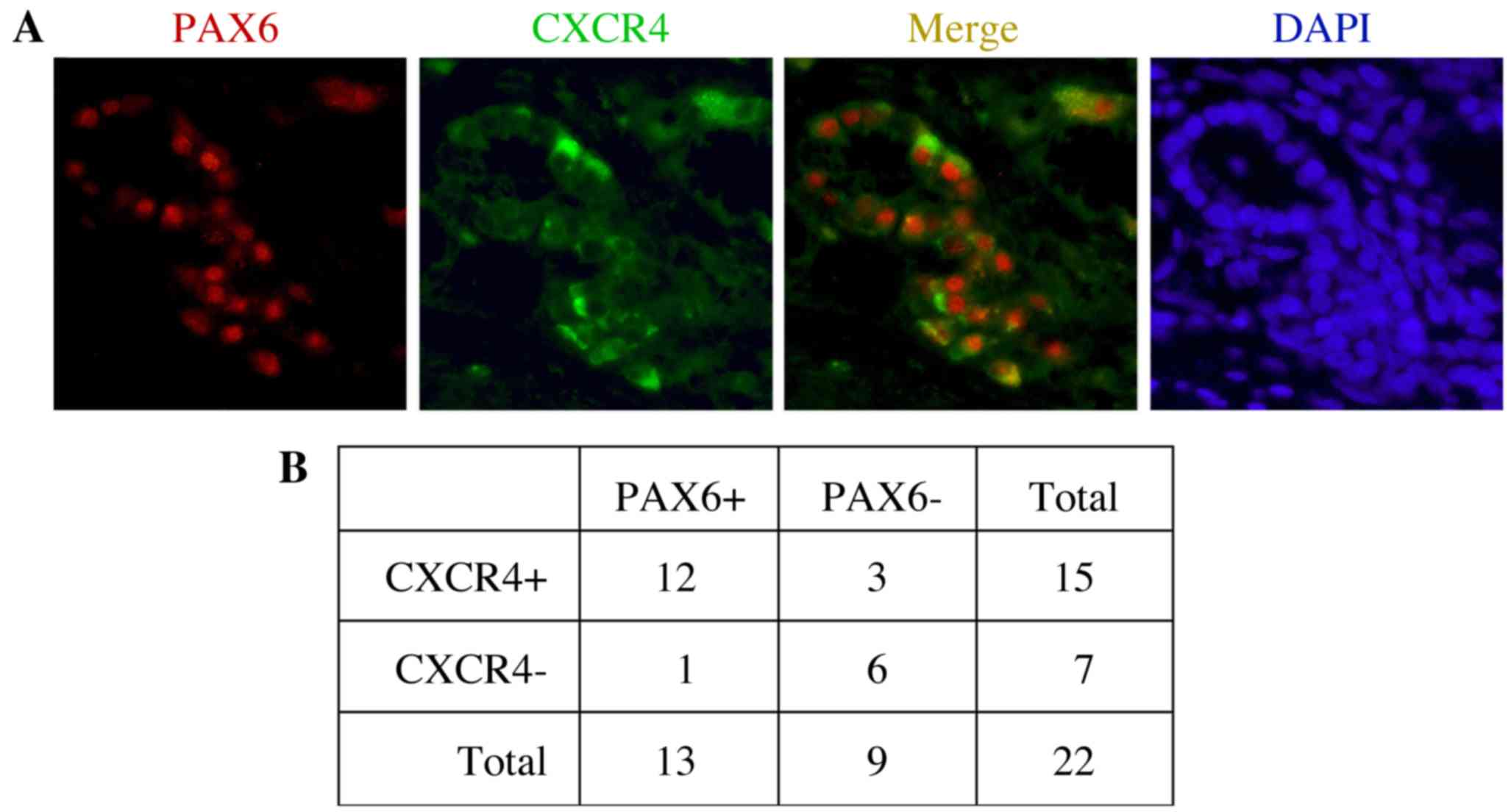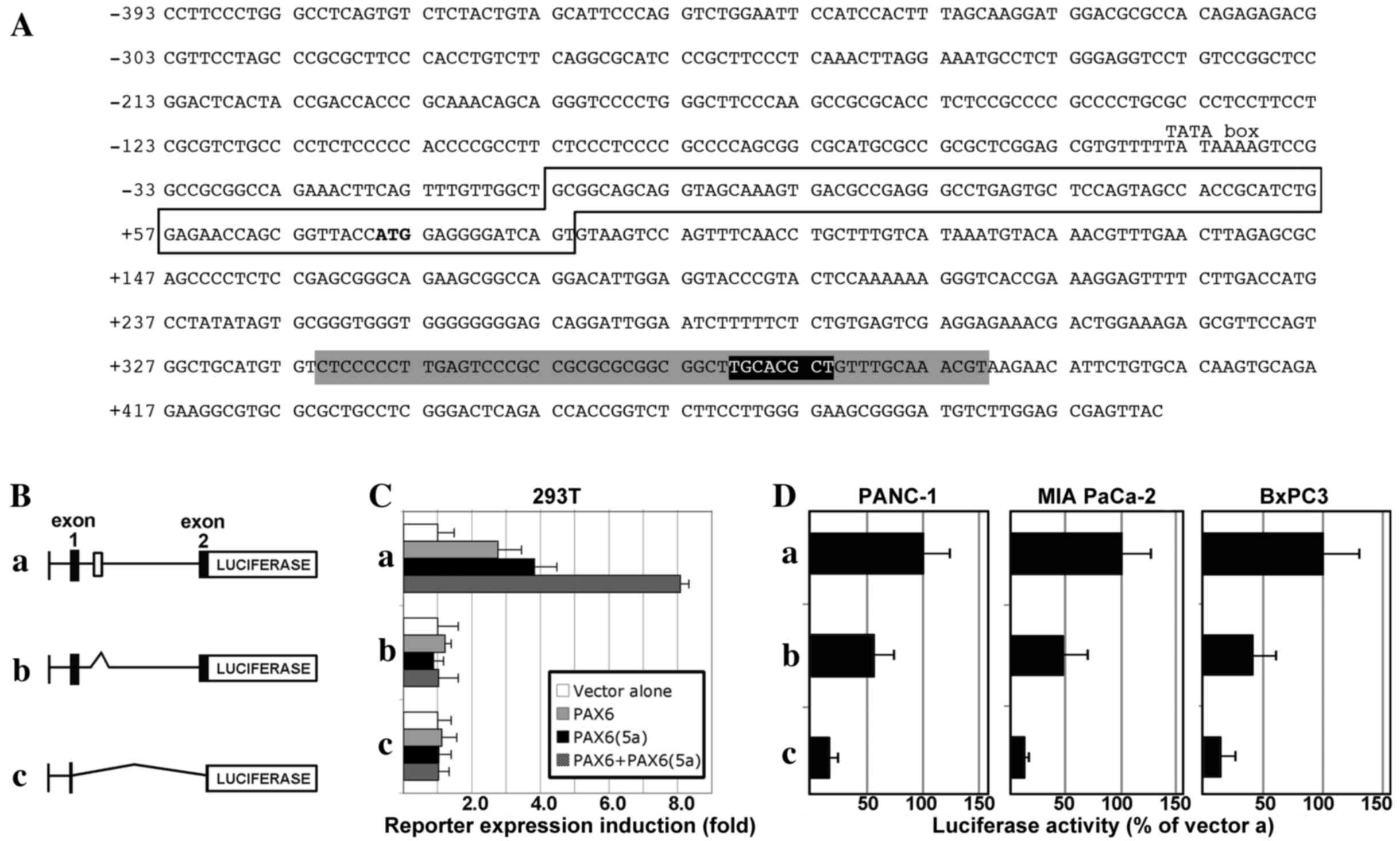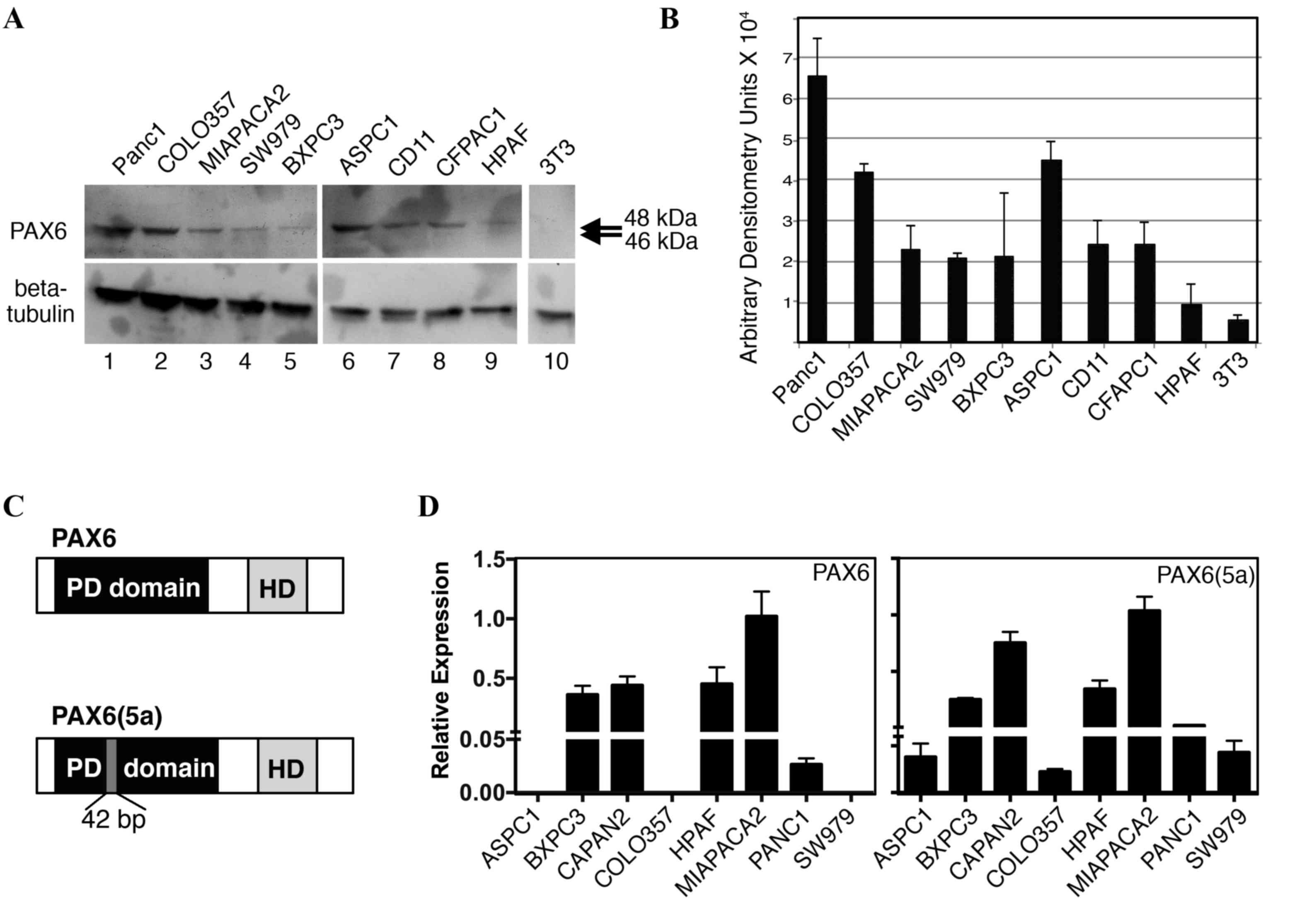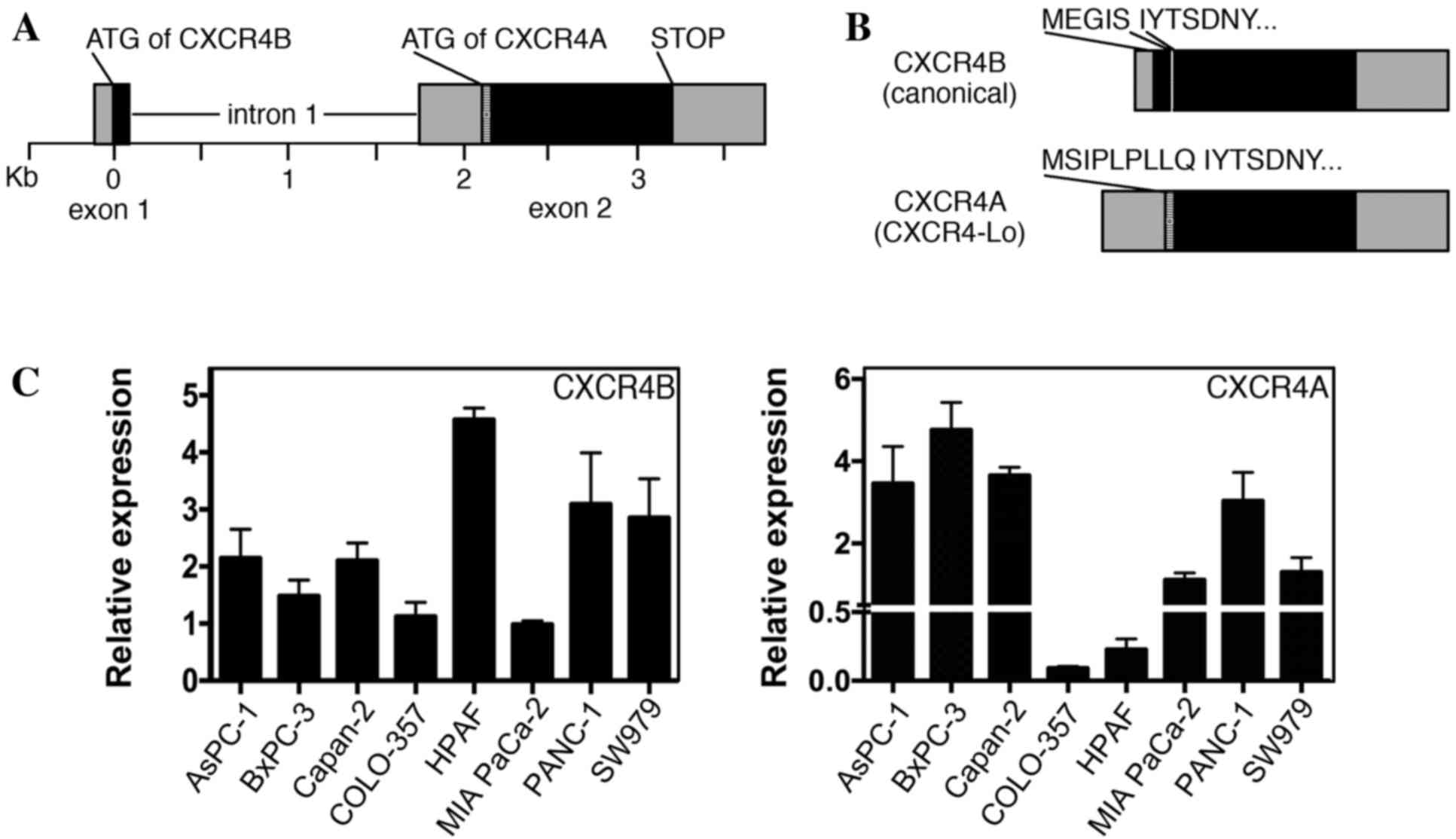|
1
|
Ilic M and Ilic I: Epidemiology of
pancreatic cancer. World J Gastroenterol. 22:9694–9705. 2016.
View Article : Google Scholar : PubMed/NCBI
|
|
2
|
Wolfgang CL, Herman JM, Laheru DA, Klein
AP, Erdek MA, Fishman EK and Hruban RH: Recent progress in
pancreatic cancer. CA Cancer J Clin. 63:318–348. 2013. View Article : Google Scholar : PubMed/NCBI
|
|
3
|
Marchesi F, Grizzi F, Laghi L, Mantovani A
and Allavena P: Molecular mechanisms of pancreatic cancer
dissemination: The role of the chemokine system. Curr Pharm Des.
18:2432–2438. 2012. View Article : Google Scholar : PubMed/NCBI
|
|
4
|
Koshiba T, Hosotani R, Miyamoto Y, Ida J,
Tsuji S, Nakajima S, Kawaguchi M, Kobayashi H, Doi R, Hori T, et
al: Expression of stromal cell-derived factor 1 and CXCR4 ligand
receptor system in pancreatic cancer: A possible role for tumor
progression. Clin Cancer Res. 6:3530–3535. 2000.PubMed/NCBI
|
|
5
|
Mori T, Doi R, Koizumi M, Toyoda E, Ito D,
Kami K, Masui T, Fujimoto K, Tamamura H, Hiramatsu K, et al: CXCR4
antagonist inhibits stromal cell-derived factor 1-induced migration
and invasion of human pancreatic cancer. Mol Cancer Ther. 3:29–37.
2004. View Article : Google Scholar : PubMed/NCBI
|
|
6
|
Wehler T, Wolfert F, Schimanski CC, Gockel
I, Herr W, Biesterfeld S, Seifert JK, Adwan H, Berger MR, Junginger
T, et al: Strong expression of chemokine receptor CXCR4 by
pancreatic cancer correlates with advanced disease. Oncol Rep.
16:1159–1164. 2006.PubMed/NCBI
|
|
7
|
Marchesi F, Monti P, Leone BE, Zerbi A,
Vecchi A, Piemonti L, Mantovani A and Allavena P: Increased
survival, proliferation, and migration in metastatic human
pancreatic tumor cells expressing functional CXCR4. Cancer Res.
64:8420–8427. 2004. View Article : Google Scholar : PubMed/NCBI
|
|
8
|
Gebauer F, Tachezy M, Effenberger K, von
Loga K, Zander H, Marx A, Kaifi JT, Sauter G, Izbicki JR and
Bockhorn M: Prognostic impact of CXCR4 and CXCR7 expression in
pancreatic adenocarcinoma. J Surg Oncol. 104:140–145. 2011.
View Article : Google Scholar : PubMed/NCBI
|
|
9
|
Marechal R, Demetter P, Nagy N, Berton A,
Decaestecker C, Polus M, Closset J, Deviére J, Salmon I and Van
Laethem JL: High expression of CXCR4 may predict poor survival in
resected pancreatic adenocarcinoma. Br J Cancer. 100:1444–1451.
2009. View Article : Google Scholar : PubMed/NCBI
|
|
10
|
Park B, Sung B, Yadav VR, Cho SG, Liu M
and Aggarwal BB: Acetyl-11-keto-β-boswellic acid suppresses
invasion of pancreatic cancer cells through the downregulation of
CXCR4 chemokine receptor expression. Int J Cancer. 129:23–33. 2011.
View Article : Google Scholar : PubMed/NCBI
|
|
11
|
Sun JS, Zhang XL, Yang YJ, Nie ZG and
Zhang Y: Hypoxia promotes C-X-C chemokine receptor type 4
expression through microRNA-150 in pancreatic cancer cells. Oncol
Lett. 10:835–840. 2015.PubMed/NCBI
|
|
12
|
Ying X, Jing L, Ma S, Li Q, Luo X, Pan Z,
Feng Y and Feng P: GSK3β mediates pancreatic cancer cell invasion
in vitro via the CXCR4/MMP-2 Pathway. Cancer Cell Int. 15:702015.
View Article : Google Scholar : PubMed/NCBI
|
|
13
|
Kubic JD, Lui JW, Little EC, Ludvik AE,
Konda S, Salgia R, Aplin AE and Lang D: PAX3 and FOXD3 promote
CXCR4 expression in melanoma. J Biol Chem. 290:21901–21914. 2015.
View Article : Google Scholar : PubMed/NCBI
|
|
14
|
Lang D, Mascarenhas JB, Powell SK,
Halegoua J, Nelson M and Ruggeri BA: PAX6 is expressed in
pancreatic adenocarcinoma and is downregulated during induction of
terminal differentiation. Mol Carcinog. 47:148–156. 2008.
View Article : Google Scholar : PubMed/NCBI
|
|
15
|
Epstein J, Cai J, Glaser T, Jepeal L and
Maas R: Identification of a Pax paired domain recognition sequence
and evidence for DNA-dependent conformational changes. J Biol Chem.
269:8355–8361. 1994.PubMed/NCBI
|
|
16
|
Goulding MD, Chalepakis G, Deutsch U,
Erselius JR and Gruss P: Pax-3, a novel murine DNA binding protein
expressed during early neurogenesis. Embo J. 10:1135–1147.
1991.PubMed/NCBI
|
|
17
|
Mascarenhas JB, Littlejohn EL, Wolsky RJ,
Young KP, Nelson M, Salgia R and Lang D: PAX3 and SOX10 activate
MET receptor expression in melanoma. Pigment Cell Melanoma Res.
23:225–237. 2010. View Article : Google Scholar : PubMed/NCBI
|
|
18
|
Mascarenhas JB, Young KP, Littlejohn EL,
Yoo BK, Salgia R and Lang D: PAX6 is expressed in pancreatic cancer
and actively participates in cancer progression through activation
of the MET tyrosine kinase receptor gene. J Biol Chem.
284:27524–27532. 2009. View Article : Google Scholar : PubMed/NCBI
|
|
19
|
St-Onge L, Sosa-Pineda B, Chowdhury K,
Mansouri A and Gruss P: Pax6 is required for differentiation of
glucagon-producing alpha-cells in mouse pancreas. Nature.
387:406–409. 1997. View
Article : Google Scholar : PubMed/NCBI
|
|
20
|
Epstein JA, Lam P, Jepeal L, Maas RL and
Shapiro DN: Pax3 inhibits myogenic differentiation of cultured
myoblast cells. J Biol Chem. 270:11719–11722. 1995. View Article : Google Scholar : PubMed/NCBI
|
|
21
|
Epstein JA, Glaser T, Cai J, Jepeal L,
Walton DS and Maas RL: Two independent and interactive DNA binding
subdomains of the PAX6 paired domain are regulated by alternative
splicing. Genes Dev. 8:2022–2034. 1994. View Article : Google Scholar : PubMed/NCBI
|
|
22
|
Gupta SK and Pillarisetti K: Cutting edge:
CXCR4-Lo: Molecular cloning and functional expression of a novel
human CXCR4 splice variant. J Immunol. 163:2368–2372.
1999.PubMed/NCBI
|
|
23
|
Glaser T, Walton DS and Maas RL: Genomic
structure, evolutionary conservation and aniridia mutations in the
human PAX6 gene. Nat Genet. 2:232–239. 1992. View Article : Google Scholar : PubMed/NCBI
|
|
24
|
Duquenne C, Psomas C, Gimenez S, Guigues
A, Carles MJ, Barbuat C, Lavigne JP, Sotto A, Reynes J, Guglielmi
P, et al: The two human CXCR4 isoforms display different HIV
receptor activities: Consequences for the emergence of X4 strains.
J Immunol. 193:4188–4194. 2014. View Article : Google Scholar : PubMed/NCBI
|
|
25
|
Ruggeri BA, Huang L, Berger D, Chang H,
Klein-Szanto AJ, Goodrow T, Wood M, Obara T, Heath CW and Lynch H:
Molecular pathology of primary and metastatic ductal pancreatic
lesions: Analyses of mutations and expression of the p53, mdm-2 and
p21/WAF-1 genes in sporadic and familial lesions. Cancer.
79:700–716. 1997. View Article : Google Scholar : PubMed/NCBI
|
|
26
|
Pfaffl MW: A new mathematical model for
relative quantification in real-time RT-PCR. Nucleic Acids Res.
29:e452001. View Article : Google Scholar : PubMed/NCBI
|
|
27
|
Sun J, Rockowitz S, Xie Q, Ashery-Padan R,
Zheng D and Cvekl A: Identification of in vivo DNA-binding
mechanisms of Pax6 and reconstruction of Pax6-dependent gene
regulatory networks during forebrain and lens development. Nucleic
Acids Res. 43:6827–6846. 2015. View Article : Google Scholar : PubMed/NCBI
|
|
28
|
Bryne JC, Valen E, Tang MH, Marstrand T,
Winther O, da Piedade I, Krogh A, Lenhard B and Sandelin A: JASPAR,
the open access database of transcription factor-binding profiles:
New content and tools in the 2008 update. Nucleic Acids Res.
36(Database Issue): D102–D106. 2008.PubMed/NCBI
|
|
29
|
Heinrich EL, Lee W, Lu J, Lowy AM and Kim
J: Chemokine CXCL12 activates dual CXCR4 and CXCR7-mediated
signaling pathways in pancreatic cancer cells. J Transl Med.
10:682012. View Article : Google Scholar : PubMed/NCBI
|
|
30
|
Singh S, Srivastava SK, Bhardwaj A, Owen
LB and Singh AP: CXCL12-CXCR4 signalling axis confers gemcitabine
resistance to pancreatic cancer cells: A novel target for therapy.
Br J Cancer. 103:1671–1679. 2010. View Article : Google Scholar : PubMed/NCBI
|
|
31
|
Kozmik Z, Czerny T and Busslinger M:
Alternatively spliced insertions in the paired domain restrict the
DNA sequence specificity of Pax6 and Pax8. Embo J. 16:6793–6803.
1997. View Article : Google Scholar : PubMed/NCBI
|
|
32
|
Kiselev Y, Eriksen TE, Forsdahl S, Nguyen
LH and Mikkola I: 3T3 cell lines stably expressing Pax6 or
Pax6(5a)-a new tool used for identification of common and isoform
specific target genes. PLoS One. 7:e319152012. View Article : Google Scholar : PubMed/NCBI
|
|
33
|
Duncan MK, Kozmik Z, Cveklova K,
Piatigorsky J and Cvekl A: Overexpression of PAX6(5a) in lens fiber
cells results in cataract and upregulation of (alpha)5(beta)1
integrin expression. J Cell Sci. 113:3173–3185. 2000.PubMed/NCBI
|
|
34
|
Singh S, Mishra R, Arango NA, Deng JM,
Behringer RR and Saunders GF: Iris hypoplasia in mice that lack the
alternatively spliced Pax6(5a) isoform. Proc Natl Acad Sci USA.
99:6812–6815. 2002. View Article : Google Scholar : PubMed/NCBI
|
|
35
|
Azuma N, Yamaguchi Y, Handa H, Hayakawa M,
Kanai A and Yamada M: Missense mutation in the alternative splice
region of the PAX6 gene in eye anomalies. Am J Hum Genet.
65:656–663. 1999. View
Article : Google Scholar : PubMed/NCBI
|
|
36
|
Chauhan BK, Reed NA, Zhang W, Duncan MK,
Kilimann MW and Cvekl A: Identification of genes downstream of Pax6
in the mouse lens using cDNA microarrays. J Biol Chem.
277:11539–11548. 2002. View Article : Google Scholar : PubMed/NCBI
|
|
37
|
Chauhan BK, Yang Y, Cveklová K and Cvekl
A: Functional interactions between alternatively spliced forms of
Pax6 in crystallin gene regulation and in haploinsufficiency.
Nucleic Acids Res. 32:1696–1709. 2004. View Article : Google Scholar : PubMed/NCBI
|
|
38
|
Pinson J, Mason JO, Simpson TI and Price
DJ: Regulation of the Pax6: Pax6(5a) mRNA ratio in the developing
mammalian brain. BMC Dev Biol. 5:132005. View Article : Google Scholar : PubMed/NCBI
|
|
39
|
Zhang W, Cveklova K, Oppermann B, Kantorow
M and Cvekl A: Quantitation of PAX6 and PAX6(5a) transcript levels
in adult human lens, cornea, and monkey retina. Mol Vis. 7:1–5.
2001.PubMed/NCBI
|
|
40
|
Sand LG, Scotlandi K, Berghuis D,
Snaar-Jagalska BE, Picci P, Schmidt T, Szuhai K and Hogendoorn PC:
CXCL14, CXCR7 expression and CXCR4 splice variant ratio associate
with survival and metastases in Ewing sarcoma patients. Eur J
Cancer. 51:2624–2633. 2015. View Article : Google Scholar : PubMed/NCBI
|


















